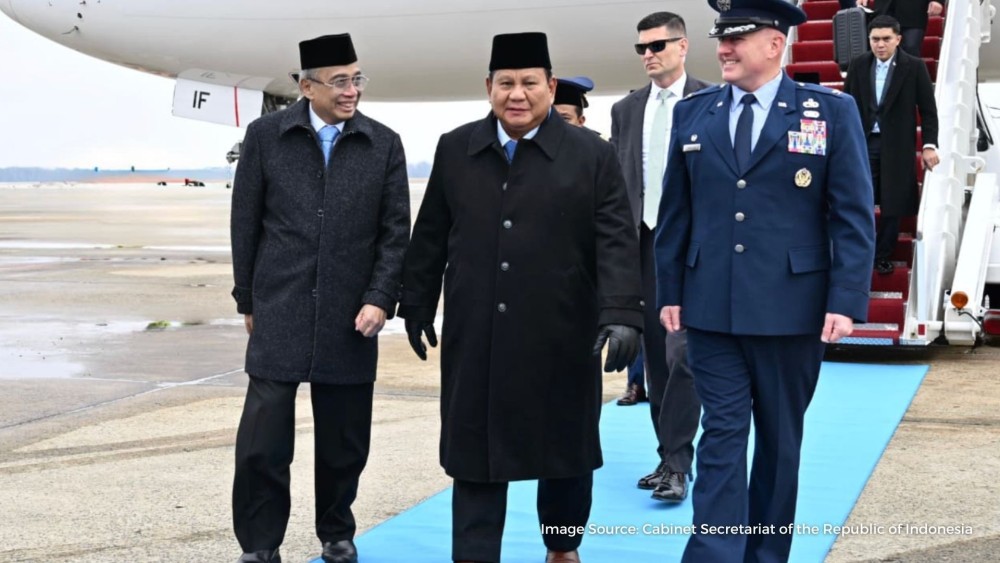This Week’s Headlines (Oct. 26 – Nov. 1, 2024)
01 Nov 2024

Govt. allocates $8.8 billion for food security in 2025
The senior food minister says a nearly 22% jump in the government’s food security budget has been earmarked for next year in a bid to fulfill the President's promise to achieve food self-sufficiency during his five-year term.
The government has earmarked a record budget of Rp 139.4 trillion (US$8.8 billion) to bolster food programs in 2025, according to the senior food minister, underscoring President Prabowo Subianto’s pledge to achieve self-sufficiency in producing key staple foods over the next five years of his term.
The 2025 food security budget is 21.9 percent higher than last year’s.
“This food security budget is quite substantial and spread across various ministries. We need strong collaboration to meet the 2028-2029 self-sufficiency target,” Coordinating Food Minister Zulkifli Hasan told reporters on Wednesday, after a closed-door meeting at the Trade Ministry.
The significant jump in the budget marks a departure from the smaller annual increases in past years: the 2024 allocation marked a 9.7 percent increase to Rp 114.3 trillion from Rp 104.2 trillion in 2023, which was up 12.9 percent from Rp 92.3 trillion in 2022.
Meanwhile, the 2022 food budget marked a contraction of 6.8 percent from Rp 99.1 trillion in 2021.
In his inaugural address on Oct. 20, Prabowo reiterated his commitment to achieving self-sufficiency in food and energy, saying this was “a must” for Southeast Asia's largest economy to become a more prosperous nation. He also expressed confidence that Indonesia could achieve food self-sufficiency in four to five years and become a major food exporter.
The food security budget covers a range of measures aimed at improving domestic agriculture, with non-ministerial spending of Rp 44.15 trillion allocated primarily to fertilizer subsidies managed by state-owned fertilizer producer PT Pupuk Indonesia.
It also covers a 150,000-hectare plantation expansion program and an 80,000 ha plantation intensification program, which are to be jointly managed by the public works and agriculture ministries at an estimated cost of Rp 15 trillion.
In addition to allocating funds from the central government, the food security budget is to draw on regional resources totaling Rp 16.25 trillion from the Village Fund and Rp 20 trillion from local administrations.
The budget plan outlines a broad range of objectives, including improving access to farming resources like seeds, fertilizers and pesticides, as well as expanding food reserves and developing so-called food barns.
The food security drive also involves interinstitutional efforts between the Agriculture Ministry, the Maritime Affairs and Fisheries Ministry, the Villages and Regional Development Ministry and the National Nutrition Agency.
The program targets key crops, such as rice, corn, sugarcane, soybean, cocoa, coffee, chili and onions, according to Zulkifli.
Indonesia last enjoyed rice self-sufficiency in the 1980s under then-president Soeharto. In recent years, the country has faced growing challenges as a result of farmland decline, population growth, climate change and technological constraints.
Last year’s domestic rice output decreased slightly to 30.9 million tonnes.
Former president Joko “Jokowi” Widodo also vowed to achieve food self-sufficiency when he took office in 2014, but that goal was unmet by the end of his 10-year tenure.
Source: The Jakarta Post
China's CNGR planning $10 bln battery material facility in Indonesia
Chinese battery material maker CNGR Advanced Material Co. is planning to build an integrated production facility worth $10 billion in nickel-rich Indonesia, a local official for the company said on Wednesday.
The investment will take place over 10 to 15 years and the company is looking for a suitable location for the plant, Magdalena Veronika, a director at CNGR Indonesia told reporters.
She said the project has been granted national strategic project status from the government, which will provide certain benefits including land procurement. It will require 3,000 to 5,000 hectares (7,413 to 12,355 acres) of land, she added.
"The investment can reach $10.5 billion which will be divided into three stages," she said.
The project is the latest venture by a Chinese-backed firm in top nickel miner Indonesia, which banned nickel ore exports in 2020 to try to establish a fully integrated battery industry and electric vehicle ecosystem at home.
CNGR, which already produces Class-1 nickel product from Indonesia, aims to produce battery precursor products at the planned new facility, Veronika said.
The company is also open to have their partners build a processing plant at their planned site.
"Our clients has said that once an integrated facility has been built, they would be happy to join us," she said, with CNGR focusing their investment in battery materials while other companies may invest in battery or other products.
Source: Reuters
Indonesian automotive sales target revised down as market weakens
The Indonesian Automotive Industry Association (Gaikindo) has revised its vehicle sales target for 2024 from 1.1 million units to 850,000 units.
Gaikindo Chairman Jongkie Sugiarto explained that the automotive market, particularly for passenger vehicles, has been sluggish throughout 2024, prompting the downward revision.
"This reduction in the target is based on low sales figures that have not shown significant improvement," Jongkie said on Monday.
According to Gaikindo's data, wholesale car sales in Indonesia reached 72,667 units in September 2024, a decline of 9.1 percent compared to the 79,919 units sold in September 2023. Retail sales (from dealers to consumers) also fell to 72,366 units in September 2024, down 10.6 percent from 80,984 units in the same month last year.
Despite the challenging market conditions, Gaikindo remains optimistic about boosting vehicle sales by the end of the year through various automotive exhibitions. One key event is the Gaikindo Jakarta Auto Week (GJAW) 2024, scheduled to take place from November 22 to December 1, 2024, at the Indonesia Convention Exhibition (ICE) in BSD City, Tangerang.
"Gaikindo is organizing several exhibitions, including GIIAS Bandung, and soon the Gaikindo Jakarta Auto Week, among others. These initiatives are all aimed at stimulating sales," Jongkie added.
From January to September 2024, total wholesale sales amounted to 633,218 units, a 16.2 percent decrease from 755,778 units during the same period in 2023. Meanwhile, retail sales dropped by 11.9 percent year-on-year to 657,223 units, compared to 746,246 units in the first nine months of 2023.
Source: The Jakarta Globe

















